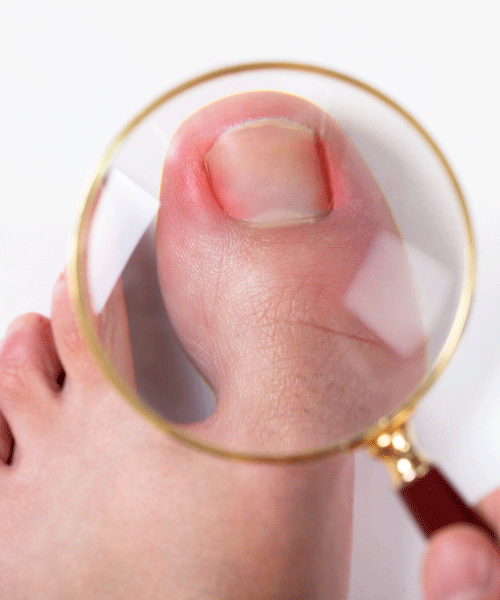Ingrown Toenail

Ingrown toenails are a common condition affecting men and women of all ages. The disease is caused when the corners or sides of the toenail grow into the soft flesh of the toe. This can result from improperly trimmed nails, tight shoes, or injury to the toe. Ingrown toenails can be painful and lead to infection if not treated properly.
There are four stages of ingrown toenails, each with different symptoms. The first stage is characterized by redness and swelling around the nail. The second stage is characterized by pain and inflammation. The third stage is characterized by an infection, which may cause pus to drain from the toe. The fourth stage is characterized by damage to the tissue around the nail, which may require surgery to repair.
The medical professional treating foot and nail problems are known as a podiatrist. However, an experienced surgeon can treat similar conditions.
Signs and Symptoms
The sign of an ingrown toenail is redness, inflamed and sore-looking toe. There may be discoloration of the surrounding tissue at times and pus or inflammatory exudate (fluid) seeping out. There may be a foul smell as well.
The toe is tender on the touch and may cause difficulty (pain) when wearing closed shoes or even walking. The patients themselves can report this condition to the doctor.
Diagnosis and tests
It doesn’t need any additional investigation.
Treatment
A few simple steps can help relieve the symptoms of an ingrown toenail. This includes using Epsom bath salts to dip your feet, using antibiotic creams, and wearing roomy footwear. This can prevent the worsening of the ingrowth.
However, if the pain is severe and the nail looks ugly or if you have developed a pus-like discharge, the surgeon may perform a small procedure on your nail where the nail has to be removed either in toto or the medial or lateral edge along with abscess drainage procedure can be done under local anesthesia or a milder form of general anesthesia.
As a preventive measure:
Clip your nails correctly:
- Do not tear or rip nails
- It is best to soak your nails in warm water before clipping and use a clean, sterile nail clipper
- Avoid trauma from an overzealous pedicure
- Don’t round off the edges of the nails
Footwear:
- Wear properly fitted footwear
- Keep your feet dry with properly fitted socks if you wear shoes
- Don’t wear narrow shoes that make your nails dig into the surrounding skin
